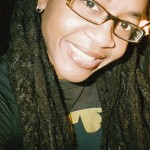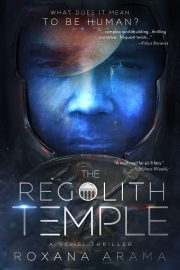Can you define African Science Fiction?
by Nnedi Okorafor
If I compiled bits of my recent phone discussions with Nollywood film director Tchidi Chikere on African science fiction, I think it would address many discussions of the topic quite well. It would go like this:
“Hello? Tee? Can you hear me? It’s Nnedi.”
“What?”
“Can you…”
“Hello?”
“Hello??”
“Hello? Nnedi, are you there?”
“Yeah, Tee, I’m here. I think this connection is bad.”
“Nnedi, how are you? I’m on location. It’s f*cking hot! I can barely hear you.”
“Oh.”
“We’re all going to die out here. It’s so hot! You wouldn’t believe it.”
“Yes, Tee but I wanted…”
“You want to know what science fiction is? An air conditioner in Nigeria that is quiet enough to run when I’m filming!”
“Ha ha ha ha ha!”
“Look, Nnedi, Nkemdili, dear, we’ll talk later. Carry your cell with you. Gotta shoot this scene…ACTION!”
*Click*
You see how science fiction from an African perspective might differ from science fiction from a Western perspective even when the science fiction is SET in Africa? Technology occupies a different space.
For more on the question of SF and Africa, check out my essay, Is Africa Ready for Science Fiction?
However, there is one thing that has bubbled to the surface since then which I feel the need to address and that is the question of “Who is African?” Walk with me and let me tell you a story…
Back when I was an undergrad at the University of Illinois, Champaign-Urbana, there was chaos over this very question. I was in my junior year. This was about a year after I had written my first short story. My sister (who was a law student at the University of Illinois) and I were members of the African Student Association (a.k.a. the ASO).
The controversy began when someone on the executive board decided that he wanted to make the ASO constitution more… specific. The change that got people angry was the part that said that the only people who could vote in the ASO were “real Africans”. Who was a “real African”? Well, according to this executive, those who had been born in Africa or those who had lived in Africa for at least ten years.
I remember my ex-husband (we were dating at the time) looking very very smug. He was born in the United States to two Igbo parents, just like me. BUT when he was three years old, his parents took him and his brothers back to Nigeria where they lived for ten years. He’d just made the cut off. He was an “authentic African”. Mind you, he hadn’t been back to Nigeria since he’d returned when he was thirteen and I’d been back and forth plenty of times since I was seven (he was not interested in going back and I was).
Soon word spread about this new change to the ASO constitution and so did the number of attendants of ASO meetings…especially when African American and Caribbean students caught wind of the controversy (thanks to my sister and me, hee hee). Even local newspapers came sniffing around. The meeting room on the day that the decision was to be made was packed with dark faces of the Black Diaspora. The executives sat at a desk in the front. You could cut the tension in the room with a knife.
No one really cared about the ASO and its duties. It had nothing to do with that. This change in the constitution, the specification, was highlighting the tension between the black peoples of the Black Diaspora. I wonder what nature the fireworks would have taken if the white South Africans had come to represent.
At some point, I grew infuriated and raised my hand are started to speak. I was giving my spiel about how the issue of “Who is Africa” is a complex one and that such things could not easily be defined and really SHOULDN’T BE defined. “And does anyone ever ask ‘Who is Asian?’ or ‘Who is European?’ There’s a problem with the very meaning of African. It’s not the same as with other places,” I was saying. Halfway through my little speech, one of the executives, Ernest Seri, turned to me. He looked me right in the face with bulging eyes, sneered and said in his bass-filled Ivory Coastian accent, “SHUT UP! YOU SHUT UP!” Mind you, my sister Ngozi had spoken before me and she has a way with words that can cut deep (she’s a lawyer). She’d basically said the same thing as me but more articulately. So already, we had gotten on Ernest’s nerves.
It’s one of those moments where things could have gone several ways. I could have jumped up and slapped the sh*t out of him (and by the look on his face, he’d have slapped me right back). I could have said, “You shut the f*ck up, a$$hole!” Or I could have just sat there stunned. I sat there stunned. I was so flabbergasted by the sheer hatred on his face. And no man had ever said such a thing to me with such nastiness. Mind you, Ernest was claiming that his wife (whom he had a child with) should be considered an African by marriage to him. His wife was white.
Eventually, because of all the press and attention, the ASO retracted the stipulation. But the damage was done. You didn’t see any African Americans who wanted to be a part of the organization. And even my sisters and I eventually left.
As for Ernest, a few years later, he was beaten to death outside a campus bar. At the time, there were speculations that it was a hate crime, as his assailants were white and he was…black in America in a predominately white neighborhood outside a bar at night. Nothing ever came of these allegations but one of the bouncers was sentenced to twenty years for first-degree murder. You can read a bit about it here ( other stories about Ernest are on Lexis-Nexus).
An aside: It was very very upsetting for me to revisit what happened to Ernest. It’s one of those things that I purposely don’t think too hard about because it hurts. Ernest was finishing his PhD in French Literature. He was only 31. Goodness, he seemed so much older than me at the time. The blow that killed him was an awful kick to his head that sent him flying. From what I recall, Ernest wasn’t even a big guy. This country, o. 🙁
My point is labels suck.
Yes, they are ways to simplify life. They make things easier to understand and faster to find. They have their uses. But when you take them too seriously, they are bullsh*t.
One last thing, when it comes to the question of “Who is African”, it MUST be remembered that colonialism and slavery happened and they left behind nasty residues that make things harder for people of a darker complexion. Is it a surprise that the first major African science fiction film was directed by a white South African and starred a white South African actor? So let’s not be in denial that there are issues of race that often fuel the tension circling this issue. There are questions of who assumes they can speak for whom. There are questions of culture and cultural appropriation. There are questions of authenticity. There are questions of blood. There are questions of history. There are questions of spiritually.
When discussing it, one should be aware that it is a sensitive topic and treat it with respect. AND DO YOUR RESEARCH!
If you are expecting me to use this essay to answer the question of “Who is Africa?”, you must be kidding. I’m not stepping into that trap. I know what I am and I know what I write.
Here’s my list of “African SF”. It’s really short. I decided to only focus mainly on novels because there are a LOT more short stories and I don’t have time to put it together. How do I define African SF? I don’t. I know it when I see it. :-P! Debate amongst yourselves. ;-). The main fact is that this list DOES exist. Africans ARE writing their own science fiction, contrary to what some may think. But the fact is that Africans need to also write more of it. As I said, this list is short…way too short. I probably missed some folks, so add to the list if you like; we should all be viewing literature with open eyes. It shouldn’t take people making lists to expose other kinds of SF. Be curious. Search inside and outside the box.
NOTE: I have not read all these! Come on, is it reasonable to assume that I have? And yes, this list is VERY dominated by South Africans of a lighter shade.
- Moxyland by Lauren Beukes
- Waiting For The Barbarians by JM Coetzee
- In the United States of Africa by Abdourahman A. Waberi
- The Stone Chameleon by Nick Wood (this is YA)
- Dr. Satan’s Echo Chamber (Chimurenga Vol. 12/13, March ‘08) This is a South African Literary journal. This volume was dedicated to African SF.
And then there’s my work. I live on borders and edges and in enchanted spaces. Betsy Wollheim, my editor at DAW, calls my forthcoming novel, Who Fears Death, “magical futurism”. It is a category that does not exist. It’s perfect, ha ha.
Zahrah the Windseeker and The Shadow Speaker are mixes of fantasy and science fiction and some other stuff. But hell, I’d be silly not to include these books on the list, so I am.
Here’s a nice essay by Nick Wood on South African science fiction (I thank Lauren Beukes for forwarding it to me): SF in South Africa
Film wise, there’s District 9. It has problems but it is definitely African science fiction.
Also, check out Pumzi, a new science fiction short directed by Wanuri Kahiu, screened at Sundance this year.
—
 Nnedi Okorafor is an award-winning science fiction and fantasy author of Nigerian descent. Her novels include Zahrah the Windseeker (winner of the 2008 Wole Soyinka Prize for African Literature) and The Shadow Speaker (An NAACP Image Award Nominee). Her forthcoming novels Who Fears Death (from DAW) and Akata Witch (from Penguin) are scheduled for release in 2010. Her Disney Fairies chapter book, Iridessa and the Fire-Bellied Dragon Frog (Disney Press), is scheduled for release in 2010. She holds a PhD in literature and is a professor of creative writing at Chicago State University. Visit her online at nnedi.com.
Nnedi Okorafor is an award-winning science fiction and fantasy author of Nigerian descent. Her novels include Zahrah the Windseeker (winner of the 2008 Wole Soyinka Prize for African Literature) and The Shadow Speaker (An NAACP Image Award Nominee). Her forthcoming novels Who Fears Death (from DAW) and Akata Witch (from Penguin) are scheduled for release in 2010. Her Disney Fairies chapter book, Iridessa and the Fire-Bellied Dragon Frog (Disney Press), is scheduled for release in 2010. She holds a PhD in literature and is a professor of creative writing at Chicago State University. Visit her online at nnedi.com.


